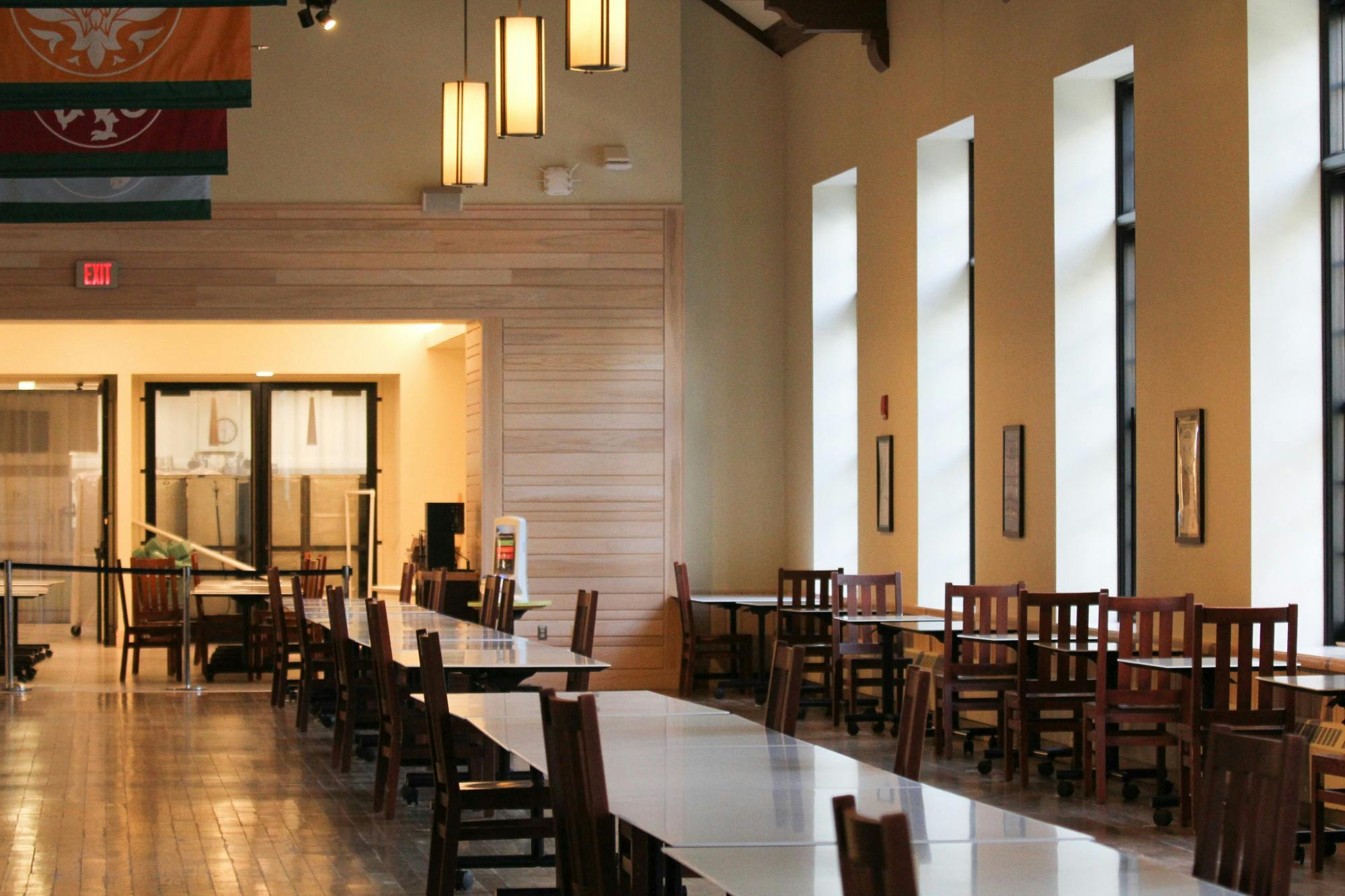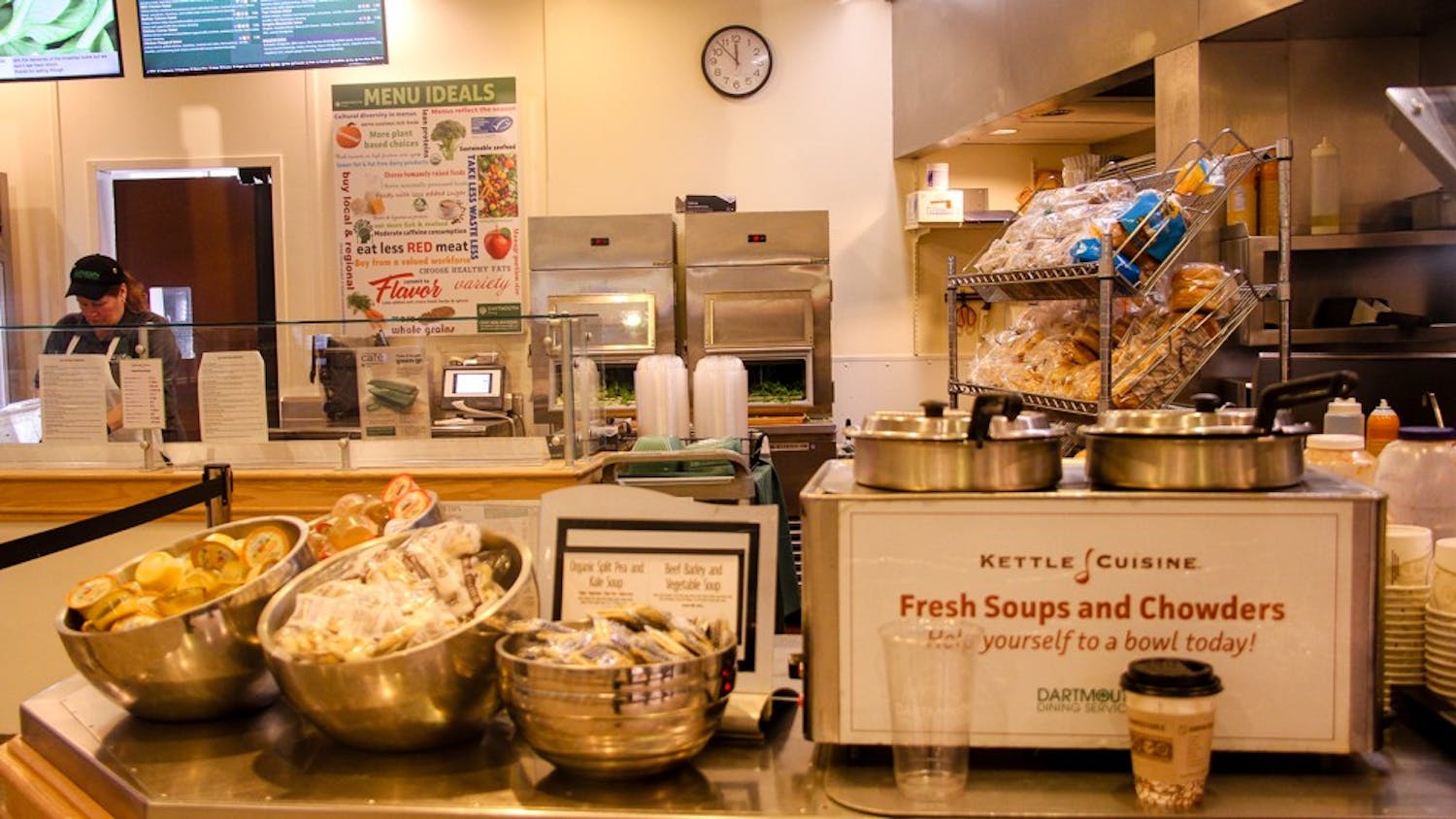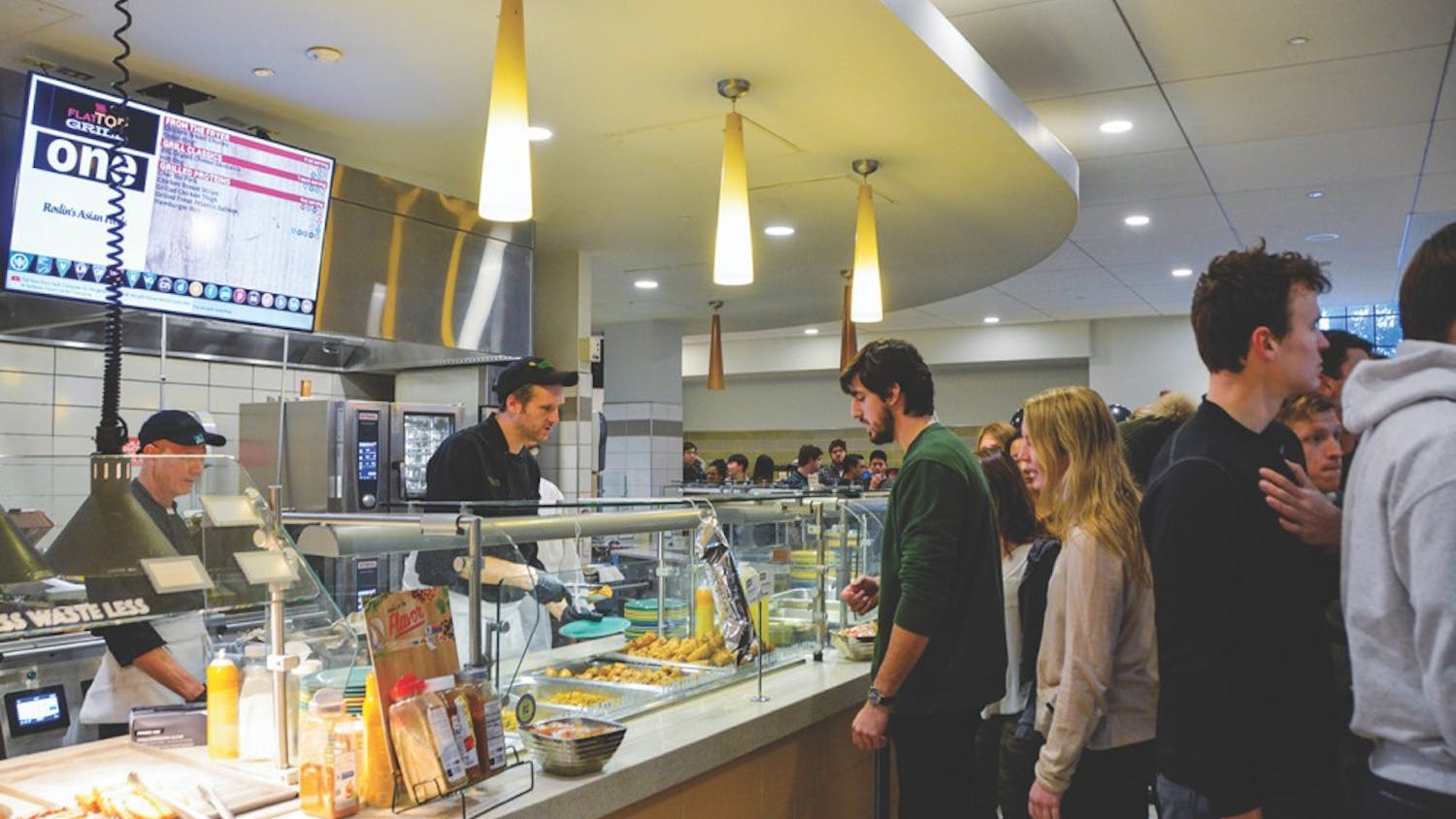This article is featured in the 2020 Freshman special issue.
From grabbing late night snacks with floormates to having club dinners, dining is an integral part of many students’ Dartmouth experience. However, as roughly 2,300 students arrive on campus this fall, they will likely have to adopt new dining habits.
With King Arthur Flour cafe in Baker-Berry Library closed permanently and the Courtyard Cafe, also known as the Hop, and residential snack bars closed for the fall term, returning students will even find some of their familiar routines disrupted: from waking up early to grab a KAF quiche to waiting in a line that stretches out into the hallway for a Hop burger.
Instead, Dartmouth Dining Services, the facility that oversees students’ meal plans and manages the College’s dining locations, will be operating in three stages throughout the term: delivering food to students during the quarantine period, serving food at outdoor service stations during the first 14 days on campus and opening the Class of ’53 Commons — colloquially known as Foco — Collis Cafe, Novack Cafe and Ramekin for undergraduate use starting Sept. 25.
A multi-staged approach to fall dining
Before students receive their first COVID-19 test result, which is expected to come back within 48 hours, they will only receive their meals by delivery to a common area within their dorm. On Sept. 1, DDS sent out a survey to students enrolled on campus in which they could indicate their food preferences and allergen concerns.
Students who test positive for COVID-19 will be able to order food directly to their dorm through an app. These students will be able to choose what type of food they want and when they want it delivered.
If their test results come back negative after the first two days of quarantine, students will have the opportunity to eat outdoors. During this stage, students can pick up their meals from one of the six service stations, and they can eat at a tent in front of ’53 Commons, on the Green or in smaller tents around campus, according to DDS director Jon Plodzik. He added that students are expected to “come very quickly through” the service stations to maintain social distancing.
Many students said they approved of the service station model. For example, Grace Chen ’24 noted that the likelihood of virus transmission will be relatively low under the model because of the outdoor operation setting.
Veronica Shea ’22 said she will consider meeting with friends to eat outside in a socially distanced manner once she is allowed to do so, adding that she expects many students, including herself, will eat on the Green given the location’s popularity.
Sng Byon ’22 said that she believes the service station model is a “much smarter plan than delivery.”
“It will do wonders for [students’] mental health in that quarantine time,” Byon said. “Even if it’s a super brisk walk to pick up your food, it’s still better than nothing.”
However, some students voiced concern over the relatively inflexible window in which they can pick up their meals under the service station model, which offers lunch from 11:30 a.m. to 2:30 p.m., dinner from 4:00 p.m. to 7:00 p.m. and breakfast — which is only served at half of the service stations — from 7:30 a.m. to 9:30 a.m.
“It is important to have designated hours to pick up the meals, but extending the hours may be helpful for some students,” Shea said, adding that DDS could consider extending breakfast by one hour.
Plodzik emphasized that students can reach out to DDS if they miss picking up their meals at the designated time periods.
“We’re really committed to making sure that no one goes hungry,” Plodzik said.
Even after ’53 Commons starts to offer indoor dining after Sept. 25, when most students are expected to end their two weeks of quarantine, Chen said she would choose outdoor dining over indoor dining.
“I would consider eating in-person at Foco, but I would prefer eating outside if that were an option too because it is a little safer,” Chen said.
Inside of ’53 Commons, students can expect to see its full food offerings and some new safety measures, such as plexiglass, all non-packaged food being plated by DDS staff and a different seating arrangement with social distancing measures, Plodzik said. He added that DDS will no longer fill personal water bottles and coffee cups.
’53 Commons will be providing food in a way that emphasizes “speed and efficiency so that we don’t create congestion in the space,” Plodzik said.
In addition, students will use disposables when taking out food instead of containers from Green2Go — Dartmouth’s reusable container program. According to Plodzik, DDS will not be able to run the Green2Go program in the fall because many of the containers are missing, and the staff are “conscious of having multiple touchpoints to create contamination.”
Students will have the option to reserve seating up to a week in advance at ’53 Commons for up to 40 minutes using OpenTable, a restaurant reservation app, Plodzik said, adding that 30 to 40 percent of ’53 Commons’ seating will be dedicated to reservations.
Apart from indoor dining at ’53 Commons starting Sept. 25, students can also access food services at Collis, Novack and Ramekin, although the three locations will only be open for take-out. Students can use the GET Funds app to pre-order food at the three locations. While Ramekin will open on Sept. 8 to serve graduate students, it will not be open to undergraduates for take-out until Sept. 25 and will not accept meal swipes, according to Plodzik.
The Ivy Flex meal plan
Another change in dining services that all students will face is the requirement to be on the Ivy Flex meal plan.
Plodzik described this meal plan as the Ivy Standard program — the meal plan that freshmen were required to be on last year — “with a few changes,” including $50 more in DBA, more options for pre-ordering through the GET app and less dining options that accept DBA. Students will have unlimited access to ’53 Commons, and they can spend their DBA at Novack, Collis and Ramekin.
According to Plodzik, the College decided to put all students on the Ivy Flex plan because “it ensures that [they] can get food if [they] end up in self-isolation or quarantine scenarios.”
Students have expressed mixed reactions to the mandatory Ivy Flex meal plan.
Shea said because of the Ivy Flex meal plan, she will be switching from having a meal plan with few swipes and lots of DBA to one that has lots of swipes and limited DBA.
“It would be nice to have more flexibility with the dining dollars because I use more dining dollars than swipes in a week,” Shea said. “It will be harder to make sure that I don’t go over.”
In the last school year, freshmen were required to select the Ivy Standard Unlimited plan during the fall term, which included unlimited access to ’53 Commons and $250 in DBA. Upperclassmen could choose from other meal plan options.
Jessica Chiriboga ’24 said that while she understands that public health precautions might explain the meal plan’s cost, which is $2,220 for the fall term, she is not satisfied with the limited food offerings given the closures of the Courtyard Cafe and residential snack bars.
“If we are getting [fewer] options, it doesn’t make sense to me why they are raising the price of the meal plan,” Chiriboga said.
According to Plodzik, the Courtyard Cafe will be closed in the fall due to a shortage of staff to keep the space sanitized. He added that staff who previously worked at the Courtyard Cafe have been relocated to ’53 Commons to provide extra help in running the full-service dining model.
“The labor model has become much more intensive in dining than it was before,” Plodzik said. “Everything has to be prepared and passed essentially through an opening and a plexiglass wall.”
Plodzik stressed that student favorites from the Courtyard Cafe will be available at other DDS locations.
Similarly, residential snack bars, located in Brace Commons, Goldstein Hall in the McLaughlin cluster and House Center B — commonly referred to as “the Cube” — will also be closed because of the reduced number of students on campus, Plodzik said. He added that the College is concerned about the potential for larger gatherings and does not want to leave snack bars as “unsupervised venues.”
Byon said that the closing of the snack bar is “so tragic,” and that she worries that the closing of the snack bars will also take away student jobs.
“As someone who lived in East Wheelock, the snack bar was the best part of living in those [house] communities,” Byon said. “I have lots of good memories at the snack bar.”
The open hours for various dining locations after indoor dining resumes has also elicited concern from students.
For the fall, Collis will be closed on weekends and will also no longer be open for late-night swipes, leaving Novack as the only dining location open after 8:30 p.m. Students are normally allowed to use late-night swipes at Collis and the residential snack bars throughout the week.
Chiriboga said she wished that more dining locations would make accommodations for students staying up late.
“Students will be up studying and Zooming past midnight. It would be nice to have more options for late night,” she said.
Byon said that she would prefer Collis to be open for late-night swipes as opposed to Novack.
“You’re not getting much nutritional value from anything that’s [at Novack], and usually that’s what you want when you’re doing late night. Overall, it’s worse for the students’ health,” Byon said.
In addition to worrying about the reduced DDS offerings in terms of food variety, location and time of access, students also expressed concern about the effects of COVID-19 restrictions on the social aspect of dining, many of them voicing plans to dine outdoors and in-person in order to combat feelings of loneliness.
Chiriboga said that while the social aspect of the dining experience will be different, she thinks that eating outside with other students will be “more beneficial.”
Plodzik noted that he is hopeful about “[going] back to a normal existence” and that DDS welcomes community input for its operations.
“I know parents are probably worried, and the students are somewhat apprehensive about what it’s going to be like,” Plodzik said. “We’re open for suggestions, we’re open to help people navigate the program. We are really in this together.”





